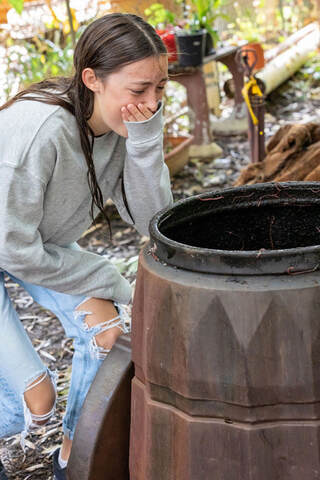News |
from Mandurah Community Gardens
News |
Real Activity, In a Real Environment, In a Real Social Setting.
Many hands make light work...Mandurah Community Gardens exists because of the work that our volunteers have put in to make it a place to grow food, to make friends, and to raise awareness in our community about growing our own food in good company. It couldn't keep going without the help of so many volunteers who contribute their time and energy, and share their knowledge. Like most community assets, this community garden is run as a registered non-profit organisation that requires a team of people that work together on the committee to manage it. Our garden is like any garden - always planning ahead, making decisions and considering the options to take. And of course, making the most of it means enjoying each other's company and having a great time! Calling Volunteers!Being a member of a community garden is just like any other community organisation. It is not like being a member of a buying club or a library because it is socially orientated and an activity-based kind of membership. It's value to the member is inherently derived from what members individually put into it. For the cost of a very inexpensive membership, Mandurah Community Gardens does provide its members with a place that is resplendent with facilities, cheap leasable and free community plots, fertiliser, seeds, tools, amenities, social events and educational workshops, plus much more — everything a good community garden and every individual member needs to keep growing. We also extend our invitation to the wider community to attend our events, our workshops, and to visit the gardens when we are open. If you ask every member who volunteers why they volunteer to help, they will tell you that they get so much more from participating in helping with the garden. They know it truly pays wonderful dividends on what they contribute. Our members strive to keep the costs of running a garden and the cost of membership down, but the only way to achieve this and keep a community garden is to receive funding and donations from individuals, businesses and government. Still, funding isn't anywhere near enough to run a community garden without the personal effort of our volunteers. Positions needed to be filledAs we have advertised through email, our Bulletin newsletter, on Facebook and on this website, we have roles that urgently need to be filled on the committee. We need volunteers for:
All of these roles are vital for Mandurah Community Gardens to function, and for it to continue to exist. Our committee members are currently pulling together to help with these roles, but it places an unfair burden on each of them to do the extra tasks required for each role above what they already do. Ultimately, it is in the best interests of all our members if every member will give their consideration to this and help us however they can. All the roles will have training provided and support from our committee members. The average commitment required for most roles is anywhere for 1-2 hours a week and sometimes a bit more for events or workshops. Committee members are required to attend a committee meeting once a month. The help from volunteers is how we have got this far, and it's how we will continue to keep going and growing. If you think you can help your community garden by volunteering your time and skills, please contact Jenny or Cheryl via the form on this website. When summer is here it comes a few things to be aware of in our community garden... Blue tongue Lizards and snakes
Pests and disease in your patch
Seed Collecting
Tomato picking in the communal beds Excited as we are to harvest tomatoes as they begin to colour, please refrain from picking them until they are RED. Vine ripened tomatoes have a better flavour. Your patch
Watering
Ants Ants are active in the garden. They do like dry covered areas. They don't like water and sunlight to nest. My suggestion is put pots up on bricks, pour boiling water into nests that are affecting your patch, and do this often. Please let me know if you have any suggestions, concerns or comments.
Thanks for keeping the pathways around your patch weed free, keep bricks, stakes and vines free and accessible for all our visitors and fellow members to use safely. Happy Gardening from Cheryl
Produce was collected from the Garden before the class so everything was wonderfully fresh. Once all the dishes were cooked, we all had a taste and it was delicious. A big thank you to the the ladies for sharing their cultural dishes with us, we all thoroughly enjoyed the morning.  These workshops and events that have been running from 2021 until this one in October 2023 would not have been possible without the very kind and generous support of the City of Mandurah. The members and committee of Mandurah Community Gardens thank you! On Friday 17th February, The Hon. David Templeman MLA, a long time supporter and patron of Mandurah Community Gardens, provided a fantastic morning tea for members at Mandurah Community Gardens to celebrate getting a $15,000 grant from Lotterywest. David, a keen gardener himself with a particular fondness for growing veggies from heirloom (heritage) seeds, kindly paid for the catering from Miss Maud's in Mandurah which was comprised of a delicious selection of their famous club sandwiches and cakes! David is as excited as all of us to see how the gardens will benefit with the extension of the covered patio area, and the installation of a new kitchen in the common room (the big shed), to built this year. A big thank you to Lotterywest for helping us with a grant, and to David for providing the occasion to celebrate! The event was covered in the local news by The Mandurah Mail and The Coastal Times in print and on their websites.
*Click on the images below to view the articles on their websites Mandurah Community Gardens Partners with Containers For ChangeReduce waste and recycle! Mandurah Community Gardens is a partner in the Containers For Change initiative and we have collection bins on site for depositing your containers for recycling. The containers are regularly collected from the gardens and are taken to a refund point. The payment we receive is then credited to our Scheme ID number. If you would like to make a donation to Mandurah Community Gardens, please drop your containers off on our open days into our Container For Change bins. Donate your containers to MCGYou can drop off your containers in person to a refund collection point and then make a donation to MCG simply by quoting our Scheme ID Member No. C10271362. The value of your deposits will be donated to Mandurah Community Gardens - THANK YOU, you will be supporting a much valued asset to our community! MCG is a not for profit community organisation and we will use these funds to cover costs of water and electricity used in the garden, ongoing maintenance in the garden and to provide resources for use in the garden. Which containers are acceptable?Check out the Containers For Change website's Container Eligibility page for more details and a handy barcode search tool to see if a container is eligible for a refund. Click here to go to the page
It's official - Mandurah Community Gardens’ 10th anniversary year celebrations have come to an end.
To finish off celebrating our 10th year, we have completed the installation of a water feature, sponsored by Fraser's Landing, as a permanent reminder of our volunteers and supporters who help to sustain our community garden - an achievement we can all be proud of! A huge THANKYOU to Michelle and the team at Fraser's Landing for all your support over the years, and for being such a great community partner!
Frasers Landing posted about this on their Facebook Page
Posted by Mandurah Community Gardens on Wednesday, 18 January 2023 West Australian waste educator Peg Davies is holding a workshop at Mandurah Community Gardens on Saturday 10th December 2022. Peg has been educating schools, organisations and local government for over 13 years, with her waste education programs winning many awards. To learn more about what Peg offers, go to her Lessen With Peg: Rethink Waste website www.lessenwithpeg.com The workshop is in 2 parts, covering:  Composting Made Easy Making compost can be a smelly or sometimes depressing experience - no more bad smells, rats or flies. You will never need to buy soil or conditioner again. We were recently given the exciting news that our grant application with Lotterywest was successful! After nearly two years in the planning, we are now able to move ahead with our planned upgrades. These include extending our under cover area by three metres and extension to the side of the roof so that our workshops can comfortably accommodate more people. We will also be adding clear café blinds to keep out the wind and rain during winter so that the area is more weatherproof.  Another project on the list - we will also be installing a new kitchen! This will give our members and visitors more working space, and a healthier environment for food preparation. The new cupboard space will also provide much needed extra storage in the shed. We anticipate the work to commence in March 2023 and that it should not be too disruptive, but we will keep you informed along the way so you know what’s happening in our beautiful garden.
Early next year we hope to have a small gathering at the garden to celebrate this wonderful grant from Lotterywest - we will publish more details closer to the event. Again, we deeply thank Lotterywest for this wonderful grant that will extend the value that Mandurah Community Gardens provides to our community. Expect updates as work progresses - stay tuned! |
Categories
All
Archives
June 2024
|
